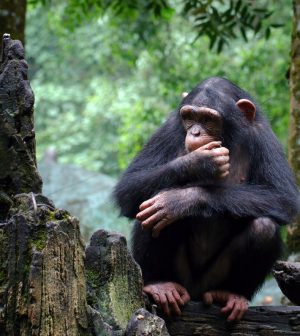- Could Your Grocery Store Meat Be Causing Recurring UTIs?
- Are You Making This Expensive Thermostat Error This Winter?
- Recognizing the Signs of Hypothyroidism
- 10 Strategies to Overcome Insomnia
- Could Artificial Sweeteners Be Aging the Brain Faster?
- Techniques for Soothing Your Nervous System
- Does the Water in Your House Smell Funny? Here’s Why
- Can a Daily Dose of Apple Cider Vinegar Actually Aid Weight Loss?
- 6 Health Beverages That Can Actually Spike Your Blood Sugar
- Treatment Options for Social Anxiety Disorder
Wild Chimpanzees May Practice Natural Medicine

They aren’t exactly ready to open a jungle clinic, but new research suggests wild chimpanzees are practicing a kind of medicine.
Fifty-one chimps living in two communities in Uganda appear to select edible plants specifically for their medicinal qualities, reports a team led by Elodie Freymann of the University of Oxford in the UK.
The chimpanzees appeared to add certain plants to their diet when battling a sickness that they didn’t normally consume when healthy.
Freymann’s team suspected this might be a kind of self-medication, so they tested the pharmacologic properties of these plants in the lab.
Reporting June 20 in the journal PLOS One, they found that 88% of the 13 trees and herbs the chimps sought out when ill contained anti-bacterial properties, while 33% were anti-inflammatory.
For example, “dead wood from a tree in the Dogbane family (Alstonia boonei) showed the strongest antibacterial activity and also had anti-inflammatory properties, suggesting that it could be used to treat wounds,” according to an Oxford news release on the study.
The bark and resin of the mahogany tree and leaves from a species of fern (Christella parasitica) also had strong anti-inflammatory properties, Freymann’s group found. In fact, one male chimpanzee with an injured hand gathered the fern leaves, perhaps to ease pain, the team noted.
In another incident, a chimp who was battling a parasitic infection was seen consuming the bark of the cat-thorn tree (Scutia myrtina).
Not only did all of this natural medicine appear to help the chimps, the compounds within these plants might hold promise for the treatment of illness in people, the Oxford team theorized.
“In this paper, we demonstrate how watching and learning from our primate cousins may fast-track the discovery of novel medicines, while also emphasizing the importance of protecting our forest pharmacies,” they wrote.
This isn’t the first time scientists have uncovered highly evolved primates practicing medicine: In another report published recently, an orangutan in Borneo was observed rubbing a medicinal plant into a facial wound, speeding healing.
More information
The Cleveland Clinic has more on wound care.
SOURCE: University of Oxford, news release, June 20, 2024
Source: HealthDay
Copyright © 2026 HealthDay. All rights reserved.










